
TCM For Pregnancy - How it Can Help with Common Discomforts
Posted by Cristal Suarez on 2023-02-21
If you are pregnant, you may be wondering how Traditional Chinese Medicine (TCM) can help you with common discomforts. Some of these are postpartum depression, anxiety, aches and pains, nausea, and vomiting. TCM has been used for centuries to treat these problems and is often recommended by your doctor or midwife.
Weight gain
Pregnancy can be a beautiful and rewarding experience, but it can also be a time of physical and emotional discomfort. As such, it's important to understand how Traditional Chinese Medicine can help with common pregnancy discomforts.
For example, acupuncture can be used to help alleviate nausea and vomiting. Acupuncture works by stimulating the release of hormones, which can ease the symptoms and improve a woman's overall health.
In addition to acupuncture, acupressure, and massage can also be effective in relieving some of the more intense symptoms of pregnancy. If you're suffering from sciatica or back pain, a massage can provide much-needed relief.
It's no secret that pregnant women tend to become physically uncomfortable during the last trimester. This includes lower extremity edema and aches and pains in the back, neck, and shoulders.
To combat these ailments, many TCM practitioners will recommend a variety of herbs and foods. These include arrowroot and bitter gourd to stimulate uterine contractions and turmeric to improve blood circulation.
Nausea and vomiting
The causes of nausea and vomiting during pregnancy are many. Some of the most common are changes in hormone levels, decreased intestinal activity, and a lack of hydration. If you have any of these symptoms, you can try certain remedies to treat the symptoms.
If you're pregnant, you should always drink lots of water. Drinking ten 8-ounce glasses of filtered water a day can help prevent nausea. Also, you should avoid stimulants.
Vitamin B6 can also be helpful. You can take 25 mg twice a day to ease the symptoms. However, you shouldn't take too much extra vitamin B6. This is because it can have a negative effect on the developing baby.
Ginger can also help. Eating ginger tea can be a great way to ease the symptoms of nausea. It can be made with honey and grated root ginger.
Acupressure is another way to relieve the symptoms of nausea. Acupressure works by stimulating the release of hormones. During the first trimester, a firm pressure on PC6 can help to alleviate the symptoms.
Postpartum aches and pains
Acupuncture and Traditional Chinese Medicine (TCM) can be powerful healing tools for postpartum aches and pains. The TCM approach promotes recovery from childbirth, helps mothers heal, and protects them from physical and mental disharmonies.
Acupuncture is an ancient method of pain management. It can help women recover from common postpartum conditions, such as constipation, back pain, and urinary incontinence. It can also help to resolve depression and anxiety, promote healthy digestion, and improve sleep.
Among the more important TCM techniques used for postpartum recovery are acupuncture and herbal medicine. Acupuncture can relieve muscle pains and tension and can promote healthy blood circulation and pituitary function. For more information, contact a licensed practitioner.
Another TCM technique is moxibustion. This is a calming treatment that involves using a mugwort herb stick to burn an acupuncture point. Because moxibustion uses warming heat, it can encourage the uterus to return to its original size.
While acupuncture is a safe and effective form of treatment, some doctors recommend other forms of therapy. Some women may also need to take pain medication.
Postpartum depression or anxiety
In the first few months after having a baby, new moms may experience some depression. Known as the postpartum blues, this type of depression can be mild or serious. However, it is important to know that there are ways to treat and cure postpartum depression.
Postpartum depression can be treated with medication, psychotherapy, and other forms of support. Those who suffer from PPD need to talk to their doctor and find a treatment that is right for them.
TCM (traditional Chinese medicine) is a holistic treatment that focuses on the body and mind. It uses acupuncture, herbal therapy, and other therapies to help heal the patient. The healing process may take weeks or months, depending on the symptoms.
During the process of childbirth, the hormones in the body decrease. This can lead to drastic mood swings. There is also a drop in thyroid levels, which affects the immune system and metabolism.
Acupuncture is a recognized way to treat postpartum depression. Some patients report relief after just one session. Other patients require several months to notice the positive effects.